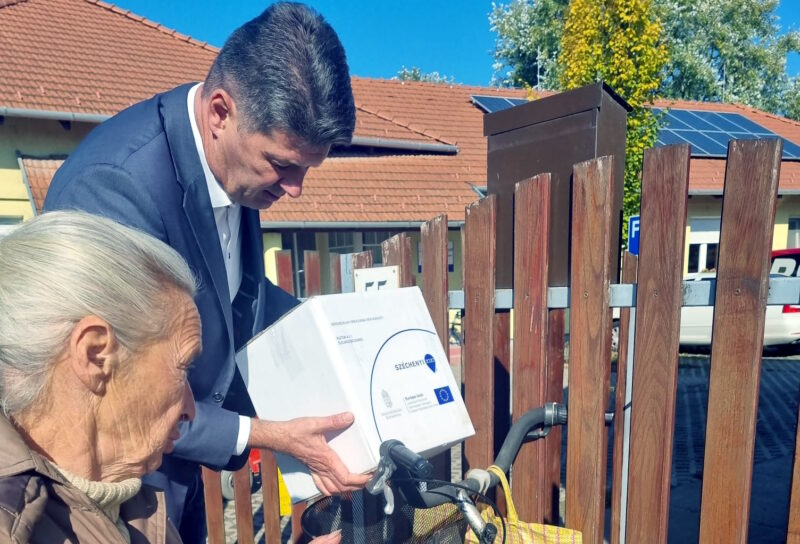Overpricing meant that much fewer people in need were served
Originally published on Global Voices

Fidesz MP Béla Mihálffy distributing an EU food package in October 2021. Source: Promotional photo from his Facebook page. Fair use.
This story was published by the Hungarian investigative journalism non-profit, Atlatszo. An edited version is published below here as part of a partnership with Global Voices.
Documents released though a Freedom of Information (FOI) lawsuit revealed that the Hungarian government was guilty of overpricing in an EU-funded package for the poor, charging 516 HUF (1.49 dollars) for liter of milk, over three times the market price of HUF 159 (USD 0.49)
Journalists from Budapest-based watchdog NGO and center for investigative journalism Atlatszo sued the Hungarian Directorate-General for Social Affairs and Child Protection (SZGYF) and won: the state institution had to disclose exactly what was in the annexes to the framework contract for food packages for the poor distributed with EU money. In 2017, these set out the prices offered by the winners of the public procurement contracts for the food put in the parcels for the most deprived. The figures show brutal overpricing.
The Hungarian government, through the SZGYF, has been distributing EU money to people in need. According to the Hungarian Central Statistical Office, one liter of milk cost HUF 205 (USD 0.59) in 2017, but it was possible to buy it for a cheaper price, according to the special offers catalogues. But not for those in need.
“The program aims to alleviate the shortage of adequate food and basic consumer goods to reduce poverty, complemented by other accompanying measures. At the same time, it aims to achieve results on two fronts: on the one hand for the most deprived and on the other hand for sustainability” — the quote is from the government’s website.
The program, coordinated by the SZGYF, was launched in 2018, and Atlatszo has written several stories about it. For months, the Directorate General has kept secret exactly what is put into the increasingly expensive food packages for people in need.
The government institution refused to release the clause to Atlatszo, which is a compulsory element of the RSZTOP-4.1.1 framework agreement, in which the three winning companies listed in detail what products they were bidding for and at what price. Atlatszo won the FOI lawsuit at the first instance at the end of 2021 and at the second instance in May 2022, so the journalists finally received the requested spreadsheet very soon afterward.
Lawsuit over the content of the food packages
Earlier, Atlatszo found out exactly what the packages contained and how their prices compared to market prices — at least according to our calculations. The first package, ordered in 2018, included 1.5 percent milk, flour, sugar, icing sugar, honey, rice, pasta, egg barley, canned green beans, canned dry beans, cooking oil, cocoa drink powder, jam, goulash cream, raisins, condensed milk, condensed tomatoes, canned luncheon meat, one of each.
Using 2020 prices, Atlatszo showed that the cheapest wholesale offer was 33 percent lower than the public offer, but the most expensive basket was also 24 percent cheaper than the winning basket.
The website of the SZGYF referred to a framework contract in the program — this has since been removed.
As part of the HUF 9.5 billion framework contract, “the unit prices for each product are included in the Sellers’ offers, with a table of these prices annexed to this contract.” This was not what SZGYF wanted to disclose, but was ordered to do so by the court.
2023 prices in 2017
Atlatszo received three spreadsheets that fixed prices in 2017, the year the contract was signed. Three companies submitted bids in the framework contract, Natur-Rost Kft., Enger Kft. and Káta-Mill Plus Bt.
According to the annex sent by the SZGYF, this is how the prices for each product were calculated. The framework contract was signed in 2018, but the procurement was in 2017, so Atlatszo team prepare the following table with added 2017 prices from the Hungarian Central Statistical Office for comparison.

Contracted prices of some food package items and prices recorded by the Hungarian Central Statistical Office in 2017 by Atlatszo, based on data from Hungarian Central Statistical Office, Directorate-General for Social Affairs and Child Protection, visualization made with Flurish.
The figures allow Atlatszo to reinterpret the victory report on the government’s website. Much more help could have come out of the European Union programme if the products had been sold at market prices — even at a profit — to those in need.
Post a Comment